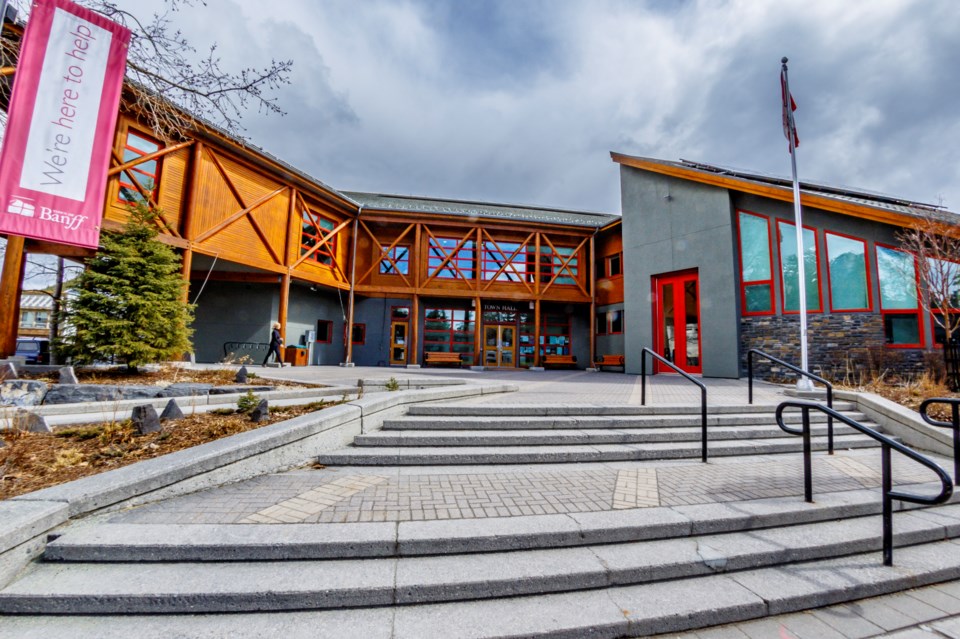BANFF – An attempt by two Banff town councillors to cap the municipal tax increase at a 5.4 per cent inflationary rate has been met with swift opposition and some testy responses.
Five days into the annual review of municipal services and programs, Couns. Ted Christensen and Hugh Pettigrew raised the idea of limiting the tax increase, seeking feedback from fellow councillors at the end of a laborious four-hour meeting on Monday (Dec. 12).
“I would anticipate and appreciate comments from the rest of council as to what that number could be, but my goal has always been to stay within the cost of inflation,” said Christensen.
“We’re inundated with many fine requests, but we can’t afford them all.”
Most councillors felt the two councillors were hijacking the budget process by bringing this up so far into service review discussions, noting the time to do this should have been at the first service review meeting on Nov. 30.
Coun. Barb Pelham was particularly taken aback.
“I have an issue with fellow councillors pressing us for a number and it’s almost like if we don’t reply with a number that you’re going to spin that against us that we wouldn’t participate in a certain process with you,” she said. “That is how it’s coming across and I find it very objectionable and I am getting a bit enraged so I would prefer to not proceed along that line.”
Pelham said council had a thorough conversation in summer when mayor and councillors collectively gave administration direction on budget expectations and the process.
“We have endured only five days worth of going through this budget, but administration has gone through months of preparing on that basis,” she said.
“It would be unfathomable to me and disrespectful to just suddenly and abruptly change the entire process that we approved in July collectively.”
As of Monday (Dec. 12), the total municipal tax levy is $22.4 million, which means a tax increase of 10.48 per cent. This represents a tax hike of just under $10 a month or almost $120 a year on an average residential dwelling assessed at $467,100.
So far during service review, council has given the green light to $708,157 worth of new tax-funded initiatives, including cybersecurity enhancements, a new finance position, a cemetery coordinator position, and a dedicated fire chief position. No decisions are final until budget in January.
In addition, $169,000 for additional mitigations for the 2023 Banff Avenue pedestrian zone and $95,000 for a permanent concept design and community will come out of the economy recovery reserve, which was funded by the province during the COVID-19 pandemic.
The budget also includes a 5.4 per cent staff cost-of-living wage increase plus another $821,336 to bring staff positions up to comparable rates with other municipalities, which is to be funded through taxes and utility rates.
The starting budget was 10.3 per cent, but council earlier approve a one-time $500,000 transfer from visitor pay parking revenues to pay for some public transit operations to help ease the burden on taxpayers.
Christensen, who was pressed to put forward a number when he indicated he wanted to limit taxes, said no offence was intended in trying to keep the tax increase to inflationary levels during this part of service review.
“The people I speak to don’t want to pay 10.48 per cent in tax increases. I speak to people whose business taxes are going up $10,000. I speak to people that question the level of service,” he said.
“I don’t know where the dust may settle, but I’d like to have a better way of guiding us rather than just we’ve approved pretty much most of the administrative recommendations, my gosh,” he added.
“I am looking for more guidance as we go into final days before we go into budget so we can think about it now. I don’t mean to be offensive. I mean to just bring it right up.”
Mayor Corrie DiManno said she is philosophically opposed to setting a number, noting that is why council moved to a process where the budget is based on the service levels the municipality is providing to the community.
“I always get uncomfortable picking a number because it’s subjective, it’s not based on anything except someone’s personal comfort with a number,” she said.
“I prefer our budget to be based on service levels we are providing to our community that we believe our residents and businesses would like to see.”
Coun. Chip Olver said she is committed to the existing process.
“We started with a budget that had 5.4 per cent growth plus already approved service levels,” she said.
“We’ve gone painstakingly over each budget area and new service level requests and voted on this as we go along, and I see this as totally stepping outside the process we’ve already embarked on.”
Coun. Grant Canning argued it is council’s job to make decisions on budget cuts or approvals.
“I don’t like the idea that council asks administration to make priorities within the service levels of what they think is more important, less important, what they think should be cut, should be saved,” he said. “That is our job.”




